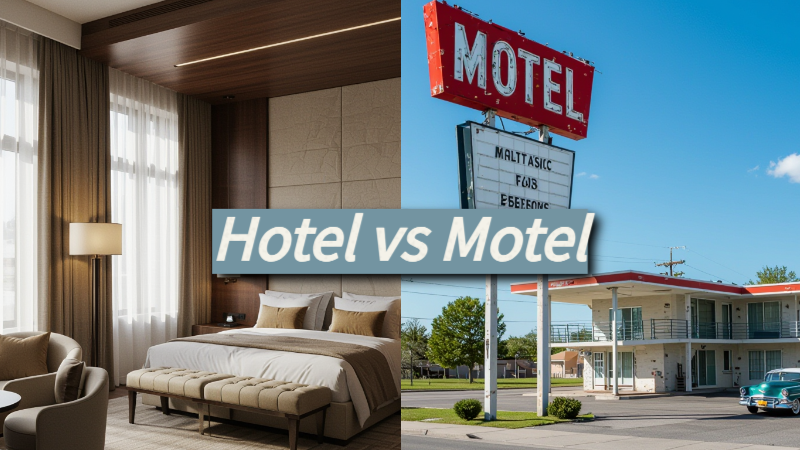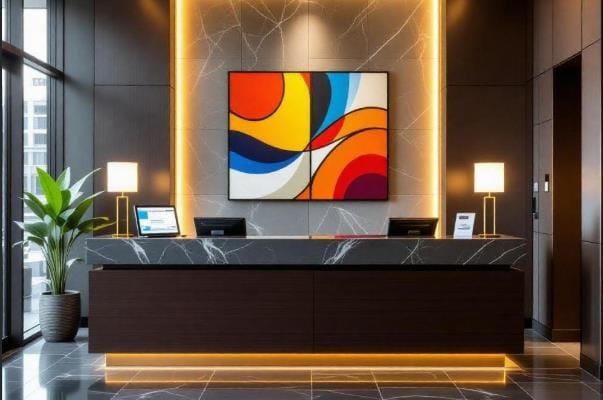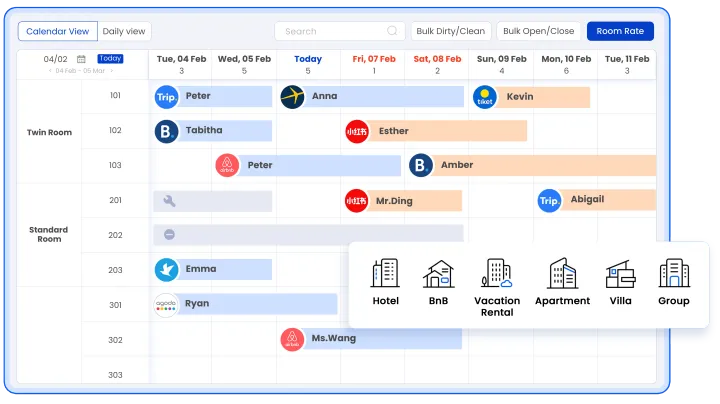What is the difference between a hotel and a motel?
Not sure how hotels and motels differ in operations, layout, and service delivery? This guide compares small hotels and motels across key business aspects—from guest expectations and staffing to ROI and pricing structure—helping property owners and managers make smarter decisions.

At first glance, hotels and motels may seem similar—they both offer travelers a place to stay. But dig deeper, and you’ll find that they serve different guest needs, follow different layouts, and operate with different levels of service.
Hotels—especially small, independent ones—often focus on comfort, service, and atmosphere. Motels, on the other hand, prioritize convenience and affordability, especially for drivers on the go.
In this guide, we’ll break down the key differences between small hotels and motels, helping you understand which model fits your needs as a traveler or property owner.
What’s the Main Difference?
| Aspect | Small Hotel | Motel |
|---|---|---|
| Access to Rooms | Through internal corridors | Direct from parking lot (exterior access) |
| Guest Type | Tourists, couples, business travelers | Drivers, road-trippers, overnight guests |
| Services | More personalized (reception, housekeeping) | Minimal (self check-in, limited staff) |
| Location | Urban or tourist areas | Highway or roadside |
| Design | Multi-floor with shared facilities | Single or double-story, no shared spaces |
| Length of Stay | Multi-night or long stay | 1–2 nights, short-term |
| Pricing | Higher average daily rate | More budget-friendly |
Why Do Travelers Choose Small Hotels?
Small hotels are often located in city centers, beach towns, or near major attractions. Guests choose them when they’re looking for:
- A more comfortable and curated stay
- Access to reception staff, concierge services, or local recommendations
- A warm, aesthetic atmosphere
- Facilities like breakfast service, lobbies, or lounges
- Reliable Wi-Fi, clean rooms, and better security
These hotels are usually independently run and focus on creating a memorable guest experience, a key reason why they receive repeat bookings and positive reviews.
Why Do Travelers Choose Motels?
Motels are built for convenience and quick rest, especially for those traveling by car. Guests typically choose motels because they:
- Can park right outside their door
- Prefer faster check-in/out
- Are stopping for the night along a long journey
- Want a no-frills, budget-friendly place to sleep
- Don’t require extended services or amenities
Motels are ideal for short stays and walk-ins, especially in highway-heavy regions or suburban locations.
Which Is Easier to Run?
Small Hotels usually require:
- More staff (reception, housekeeping, customer service)
- Better service consistency and training
- A stronger brand and online presence
- More complex Property Management Systems (PMS) to handle multi-day stays, OTAs, and guest requests
Motels can often run with:
- Fewer staff
- A leaner setup focused on efficiency
- Simple, fast guest processing tools (check-in, payments, room status)
- Basic PMS features for rate setting and availability control
Costs & Return on Investment (ROI)
| Category | Small Hotel | Motel |
|---|---|---|
| Startup Costs | Higher (design, amenities, licenses) | Lower (basic structure, fewer services) |
| Operating Costs | Staff wages, marketing, upkeep | Lean staff, fewer utilities |
| ROI Timeline | Slower, but higher long-term potential | Faster, especially in high-traffic locations |
Can You Turn a Motel into a Boutique Hotel?
Yes. Many motels in desirable locations have been successfully upgraded into boutique hotels by:
- Renovating interiors with modern design
- Adding basic services like breakfast or concierge
- Improving branding and online presence
- Listing on niche booking platforms targeting travelers seeking unique stays
It’s a popular path for owners looking to boost nightly rates and attract a more loyal audience.
Hotel vs. Motel: Which Is Right for You?
If your property is in a tourist-friendly area and you're looking to offer a more immersive experience, a small hotel is the right model. You'll attract travelers looking for comfort, service, and atmosphere—and you can charge more for it.
If your location is closer to roads, highways, or transit hubs, and your goal is high occupancy with low complexity, a motel may be a better fit. It's easier to run, requires less investment, and serves a clear traveler need.
Manage Either with the Right PMS
Whether you run a cozy hotel or a roadside motel, managing bookings, guest preferences, and daily operations should be simple. That’s where a smart order Property Management System (PMS) comes in.
- For hotels: Multi-channel booking management, guest profiles, dynamic pricing, front desk and housekeeping coordination.
- For motels: Quick walk-in registration, same-day booking, simple check-in/out, mobile access.
FAQs
1. Are motels always cheaper than hotels?
Yes, generally motels are more affordable due to fewer services and simpler setups.
2. Can a small hotel compete with big chains?
Absolutely. Personalized service, authentic experiences, and great reviews often make small hotels stand out.
3. Do motels make good investments?
Yes, especially in high-traffic areas. They often offer faster ROI with lower risk.
4. What’s the best PMS for small hotels and motels?
Look for flexible systems that support quick check-ins, OTA integration, and mobile use. A solution like Smart Order all-in-one property management system, adapts to both types of properties.
Need help choosing the right PMS for your hotel or motel?
Start your free trial with Smart Order PMS today and see how simple property management can be. Whether you’re upgrading a motel or running a boutique property, we’re here to help simplify your operations and grow your revenue.





